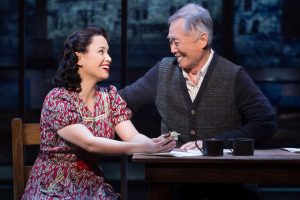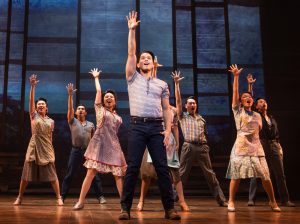All-American ‘Allegiance’ Debuts on Broadway
Ladies and gentlemen, allow me to introduce Allegiance, the all-American Broadway musical, now in residence on the Great White Way.
George Takei, who created the iconic character of “Mr. Sulu” on the original Star Trek television series, was evacuated with his family and other Japanese Americans to an internment camp at the beginning of World War II. This mass internment was a shameful incident in American history, but Jay Kuo, Marc Acito, and Lorenzo Thione’s musical version turns the story into a big-hearted celebration of American ideals.
Like the Takeis, the Kimura family is ordered out of their farm in California’s Salinas Valley and into a camp in Heart Mountain, Wyoming. The family is headed by Tatsuo Kimura (Christòpheren Nomura) and includes his daughter, Kei (Lea Salonga), son Sammy (Telly Leung), and grandfather, Ojii-chan (Mr. Takei).
Life in the camp is hard, and even the sympathetic among those in charge, such as Nurse Hannah Campbell (Katie Rose Clarke), can’t do much to help. Nevertheless, the camp residents persist in the belief that if they can demonstrate to the American people that they are patriotic the error their government made will be realized and rectified. They are encouraged in this belief by Mike Masaoka (Greg Wantanabe), the head of the Japanese American Citizens League, who also advocates on their behalf with Federal officials.
In particular, Sammy wants to demonstrate his patriotism by fighting for his country, but some time will go by before he is allowed to do so. Masaoka negotiates the creation of a segregated unit for those in the camps, but the Feds insist on weeding out anyone who might be disloyal prior allowing volunteers to serve. The device for doing so, a questionnaire, splits the community, including members of the Kimura family.
[quote]…a big-hearted celebration of American ideals[/quote]
While the Acito-Kuo-Thione book doesn’t shirk from depicting the privation of the internment experience, it doesn’t focus much attention on how bad things were. Rather, it plays up how resilient the community remained and how it was even able to tolerate differing ways its members chose to express their allegiance to a government that was clearly oppressing them.
Mr. Kuo’s music and lyrics hone to the traditions of the American musical. Their form is true to the genre, and at their best they provide plenty of fodder for the voices of Ms. Salonga, Mr. Leung, and Michael K. Lee, who plays Frankie, Suzuki, Ms. Salonga’s love interest. When not directly driving the plot, the songs reflect American musical ideals as well, and titles such as “Higher,” “With You,” and “Stronger Than Before” provide direct examples of those ideals.
While these songs represent the show’s strengths, Mr. Kuo’s score is uneven. At its best the music soars and the lyrics fuel the soaring. At its worst, the music is generic and the lyrics facile.
The principal performers all work at a high level, as long as they are given enough to work with. Ms. Salonga not only brings her formidable voice to the stage, but she also personifies a woman who has lost confidence in herself and who finds it again through the internment experience. Mr. Leung is as all-American a young man as could be imagined, and Mr. Lee nearly walks off with the show as a man whose expression of allegiance is different. Mr. Takei is charming, funny, and full of wisdom. Mr. Wantanabe, despite being good-naturedly booed by some at the curtain call, invests Matsaoka with humanity and benign intent. Unfortunately, despite singing well, both Ms. Clarke and Mr. Nomura mostly disappear into characters that have little to do.
As he did at the Old Globe, in San Diego, where Allegiance had its world premiere, director Stafford Arima leads a production that builds emotional weight nicely and moves easily between scenes. The scenic design by Donyale Werle and the costume design by Alejo Vietti, along with a bit of Andrew Palermo’s choreography, add the few touches of Japanese culture that are evident. These touches insure, at least in part, that the “Japanese” nature of these characters is not lost.
Allegiance benefits from allowing its audiences to believe that “we all have the same dreams, the same struggles,” and its tear-jerker ending reflects on the importance of pulling together no matter what. Recent U. S. events have made clear, however, that we still do not live in a society that values its diversity wholeheartedly. For all of its many strengths, Allegiance may paint a rosier portrait than is warranted.
[box]Allegiance is performing an open-ended run at the Longacre Theatre, 220 West 48th Street, between Broadway and 8th Avenue in New York City. Tickets available through Telecharge.
DOWNLOAD CAST AND CREDITS HERE[/box]

In addition to reviewing theatre for San Diego Story, Bill also reviews for TalkinBroadway.com. He is a member of the San Diego Theatre Critics Circle and the American Theatre Critics Association. Bill is an emeritus professor in the School of Journalism and Media Studies at San Diego State University.


